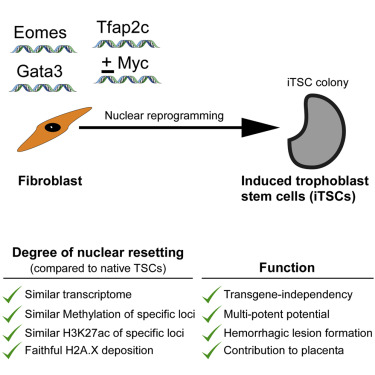Placental Cells Obtained Directly from Skin Cells

Scientists from Hebrew University of Jerusalem have obtained functional placental cells from epitelial cells, without passing through a pluripotent state. Mouse skin cell nuclei were reprogrammed in vitro into induced trophoblast stem cells by expressing three genes. The study has been published in the journal Cell Stem Cell.
Regenerative medicine is a very promising discipline. Embryonic stem cells (ESCs) lines can be propagated indefinitely and maintained in vitro for medical use by differentiating them into any cellular type. ESCs have the potential of contributing to organ regeneration or formation, have already been transformed in vitro in cardiomiocytes, hepatocytes and many other cell types, and have been used as models in the preclinical stage of drug development. ESCs, however, present two main problems: rejection by the receptor´s immune system and ethical considerations of embryo use.
About 10 years ago, induced pluripotent stem cells (iPSCs) appeared as an alternative to ESCs. iPSCs are derived from adult, differentiated cells, and are reversed to a pluripotent state by the insertion and expression of genes that reset the epigenome. Multiple cell types have been obtained by this method, that solves the two main problems of ESCs: rejection by the immune system and need of a donor embryo.
Placental integrity is paramount for the proper development of the fetus, but it also has effects on the mother´s health during all her life. Placental insufficiency is treated with placental precusor cells, TSCs, from which all placental cell types originate. But TSCs are very hard to propagate in vitro.
Epigenetic reprogramming by transient expression of three genes
Dr. Yosef Buganim and his colleagues have found an innovative technique to originate TSCs. The team cultivated mouse fibroblasts and exposed them to the transient ectopic expression of three genes: Gata3, Eomes, and Tfap2c. This resulted in stable formation of iTSCs, without passing through a pluripotent state (iPSCs), and it is the first time such thing happens. The iTSCs were epigenetically similar to canonical TSCs, and functionally equivalent.
This pioneer study demonstrates that nuclear reprogramming can happen directly between differentiated cells, without the need of passing through a pluripotent state. Women affected by placental dysfunction are now closer to a definitive solution. Placenta regeneration with iTSCs will avoid problems like birth defects or complications for the mother.
Source. AFHU


